|
|
|
Sort Order |
|
|
|
Items / Page
|
|
|
|
|
|
|
| Srl | Item |
| 1 |
ID:
095561
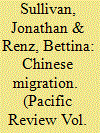

|
|
|
|
|
| Publication |
2010.
|
| Summary/Abstract |
In contrast to Sino-Russian relations at the state-level, regional cooperation between the contiguous Russian Far East and Chinese North East has been difficult to achieve, despite the existence of seemingly natural economic complementarities. This article asks why this is the case and argues that one important stumbling block, i.e. negative reactions to Chinese labour migration, has become less problematic. Situating Russian Far East/Chinese North East relations in a regionalist framework the article compares the salience and framing of major issues in regional relations in Chinese and Russian media at the national and regional levels. Contrary to earlier research, the findings suggest that economic and regional development issues, and not Chinese migration into the Russian Far East, are by far the most salient sets of issues on both sides. However, significant differences in the framing of these issues suggest that a convergence of opinion on the desirability of regional cooperation masks contradictory expectations for the direction of regional development.
|
|
|
|
|
|
|
|
|
|
|
|
|
|
|
|
| 2 |
ID:
114604
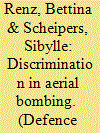

|
|
|
|
|
| Publication |
2012.
|
| Summary/Abstract |
This article questions the notion that the norm of discrimination in air
warfare has become increasingly relevant among Western publics, policy-makers and the military in the course of the 20th century. The article offers a critique of the existing literature, which tends to
overemphasise the contrast between the largely indiscriminate use of air
power in World War II on the one hand and the greater restraint in air
strikes in armed con?icts in the second half of the 20th century on the
other. This critique will be underpinned by six short case studies discussing the uses of air power in limited con?icts from the 1920s to-today. The ?ndings indicate that the norm of discrimination had a great
salience in small wars ever since the emergence of air power
|
|
|
|
|
|
|
|
|
|
|
|
|
|
|
|
| 3 |
ID:
129461
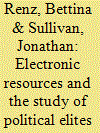

|
|
|
|
|
| Publication |
2013.
|
| Summary/Abstract |
Developments in the information society in Russia have led to the creation of an abundance of online primary texts by political actors and institutions. This article surveys a large selection of official electronic texts with the aim of encouraging more extensive use of online sources and easing researchers' navigation of Russian politicians' use of the internet. While the authors do not claim that online data can replace the insights gained from elite interviews, the article suggests that online texts could be used more extensively as a valuable addition to existing methods applied to the study of Russian political elites.
|
|
|
|
|
|
|
|
|
|
|
|
|
|
|
|
| 4 |
ID:
073647
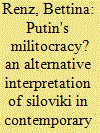

|
|
|
|
|
| Publication |
2006.
|
| Summary/Abstract |
This article challenges the perception of the rising numbers of siloviki in Russian politics as a conscious strategy and expression of a more authoritarian policy direction pursued by President Putin. Contextualising the phenomenon within the framework of the system of elite recruitment in contemporary Russia, and engaging in a micro-level study of individual siloviki, the article argues that the role of these figures is more modest than often asserted and the possibility of a coordinated 'siloviki project' is unlikely.
|
|
|
|
|
|
|
|
|
|
|
|
|
|
|
|
| 5 |
ID:
117643
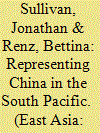

|
|
|
|
|
| Publication |
2012.
|
| Summary/Abstract |
Chinese diplomacy, aid, economic interactions and manifestations of soft
power have increased the country's influence in the South Pacific region. By some
accounts, China's influence is already approaching that of traditional stakeholders
Australia and New Zealand. In Africa and other regions state-led and private activities
in established powers' perceived spheres of influence has caused concern and
inspired particular narratives about China's motivations. In this article we examine
how media discourses in Australia and New Zealand have represented China's role in
the South Pacific. We find that China's role has been constructed using multiple
negative frames, which seek to establish China as unequivocally 'different'. More
than being unencumbered by the constraints of public opinion and a free press, China
is portrayed as operating in a different moral universe, in which the cold hearted
exploitation of vulnerable island nations (often in cahoots with venal island elites) is
entirely normal. The article shows how such constructions reveal some of the
complex issues involved in Australia and New Zealand's relationships both with
China and other South Pacific nations.
|
|
|
|
|
|
|
|
|
|
|
|
|
|
|
|
| 6 |
ID:
130860
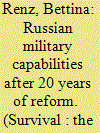

|
|
|
|
|
| Publication |
2014.
|
| Summary/Abstract |
Despite widespread perceptions, Russia is close to having the military it needs. In the aftermath of the Cold War, the leaders of the Russian Federation faced the unenviable task of creating national armed forces using what was left of the Soviet military. Plans to provide 'traditional' defence and to meet future challenges were considered as early as 1992, leading to a string of reform programmes over the next two decades. Such efforts were closely observed by analysts in the West and Russia, who documented the drawn-out process in a large body of literature. The assessments provided in the bulk of these works were almost unanimous: the reforms had failed, leaving the Russian armed forces 'impoverished, demoralized and largely ineffective', 'woefully inadequate to address the country's security threats' and standing 'perilously close to ruin'.
During the presidency of Boris Yeltsin, the reforms were seen as botched jobs that merely reduced troop numbers, essentially leaving Russia with a smaller version of a Soviet-style, mass-conscription army. The latest push for change, announced in the wake of the country's 2008 war with Georgia, during which the performance of the Russian military was widely criticised, met with a warmer reception, at least initially. It envisaged a comprehensive shift away from low-tech to high-tech; from conscription to professionalism; and from mass to mobility. Some structural changes, such as the transition from divisions to brigades and the streamlining of central command, were executed with impressive speed, raising expectations that Russia was finally on its way to acquiring a 'modern' military. As time went on, however, observers noted a range of problems that, in their eyes, dampened the prospect of ultimate success. The Russian defence industry remained unable to produce advanced equipment. The possibility of ending conscription and moving towards an all-volunteer force seemed to be as remote as ever. Moreover, the 2010 military doctrine continued to emphasise mobilisation, instead of focusing on permanent readiness and rapid reaction. When Defence Minister Anatoly Serdyukov was replaced by Sergei Shoigu - a long-standing ally of Russian President Vladimir Putin - in November 2012, some experts argued that the 2008 reforms were in effect 'dead'.
|
|
|
|
|
|
|
|
|
|
|
|
|
|
|
|
| 7 |
ID:
094066
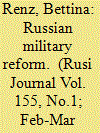

|
|
|
|
|
| Publication |
2010.
|
| Summary/Abstract |
Russia's war with Georgia highlighted the weaknesses of its armed forces. Recent reforms have sought to redress structural problems, but the political will needed to give Russia a modern, professional army - able to fight limited, regional wars - is still insufficient. Moscow needs to fully embrace the end of conscription, the integration of state-of-the-art military hardware and wider political reform.
|
|
|
|
|
|
|
|
|
|
|
|
|
|
|
|
| 8 |
ID:
070797
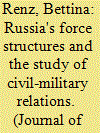

|
|
|
|
|
| Publication |
2005.
|
| Summary/Abstract |
We have to consider the whole complexity of the meaning of the military in Russia, where shoulder to shoulder with the "first army"-the armed forces-there is a second one.1
In addition to the regular armed forces overseen by the Ministry of Defense, contemporary Russia has nine distinct institutions, or force structures, that have under their command their own militarized or armed formations. These institutions have remained noticeably understudied to date. This article provides an introduction to each component of the force structures and concludes that their existence should influence the future agenda of Russian civil-military relations analyses.
|
|
|
|
|
|
|
|
|
|
|
|
|
|
|
|
| 9 |
ID:
103966
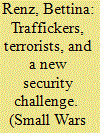

|
|
|
|
|
| Publication |
2011.
|
| Summary/Abstract |
The collapse of the Soviet Union precipitated the massive expansion of drug use and trade in Russia. The country now has one of the largest populations of injecting drug users in the world and has become the largest single-country market for Afghan heroin. In 2003 the Federal Service for the Control of the Drugs Trade was created to coordinate a comprehensive counternarcotics strategy appropriate to the scale of this threat. The service continues to face a number of challenges in its early stages of development. However, it has made considerable advances in improving responses to large-scale organised crime and in building international cooperation.
|
|
|
|
|
|
|
|
|
|
|
|
|
|
|
|
|
|
|
|
|